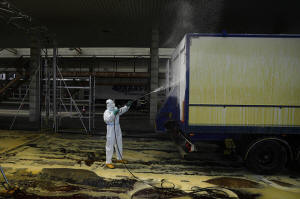Foot-and-mouth disease outbreak in Central Europe leads to animal culls
and border closures
[April 12, 2025]
By JUSTIN SPIKE
LEVÉL, Hungary (AP) — Authorities in several countries in Central Europe
are working to contain an outbreak of foot-and-mouth disease among
cattle populations that has caused widespread border closures and
required the killing of thousands of animals.
The outbreak was first detected on a cattle farm in northwestern Hungary
in early March, and animals on three farms in neighboring Slovakia
tested positive for the highly transmissible virus two weeks later.
Since then, animals from an additional three farms in Hungary and
another three in Slovakia have tested positive for the virus, the first
outbreak of the disease in either country in more than half a century.
"Everything is completely upside down” in the area as farmers fear for
their own herds and transportation is disrupted by border closures, said
Sándor Szoboszlai, a local entrepreneur and hunter in the Hungarian town
of Levél where nearly 3,000 cattle had to be culled after the disease
was discovered on a farm.
“We didn’t even think such a thing could happen. Who could count on
that? Nobody,” he said. “There are big farms in the area, but I don’t
think it was the fault of the animal owners, that’s for sure. The wind
blew it here.”
Foot-and-mouth disease primarily affects cloven-hooved animals like
cattle, sheep, goats, pigs and deer, and results in fevers and blisters
in the mouth and hooves. The virus spreads through contact between
animals, or on surfaces like clothing, skin and vehicles, or on the
wind. It poses little danger to humans.
On Friday, authorities in Hungary continued to conduct operations aimed
at stopping the spread of the disease and disinfecting affected farms
and vehicles in the area. Mats doused in a powerful disinfectant were
placed at the entrances and exits of towns and villages across the
region to eliminate virus molecules that may cling to tires — though
many of those mats quickly went dry and were swept partially off the
road by passing vehicles.
This week, the Slovakian government, citing insufficient containment
measures by Hungary, closed 16 of their common borders and one with
Austria, all of them lesser-trafficked crossings so authorities can
focus on conducting border checks at the major ones. Last week, Austria
— where there have been no reported cases — closed 23 of its border
crossings with Hungary and Slovakia.
Authorities in the Czech Republic, relatively distant from the Hungarian
and Slovakian farms where the disease has been detected, have introduced
disinfection measures at all the five border crossings used by freight
trucks entering the country.

[to top of second column]
|

A firefighter sprays a truck with disinfectant to try to prevent the
spread of a the highly infectious foot-and-mouth disease from
Slovakia at the border in Lanzhot, Czech Republic, Friday, April 11,
2025. (AP Photo/Petr David Josek)
 Jiri Cerny, associate professor at
the Czech University of Life Sciences in Prague, said the most
significant risk of transmission is “through contaminated human
objects” such as ”tires and cars, on the soles of shoes, and through
contaminated food.” The Czech Agriculture Minister, Marek Výborný,
has said the restrictions could be lifted 30 days after the last
farm animal infected with foot-and-mouth disease has been culled in
Slovakia.
No new infections have been discovered in Hungary this week, and the
cleanup of the last infected farms will likely be completed on
Saturday, István Nagy, Hungary's agricultural minister said on
Friday.
Earlier this week, a Hungarian official said in a news conference
that the foot-and-mouth disease outbreak may have been caused by “an
artificially produced virus."
Without citing specific evidence to back his claims, Gergely Gulyás,
chief of staff to Hungarian Prime Minister Viktor Orbán, said it
couldn't be ruled out that the disease had been released in Hungary
as a “biological attack,” adding that the suspicion was based on
verbal statements from a laboratory in a foreign country that had
begun initial analysis of viral samples.
Hungary's government has promised to institute a loan payment
moratorium for affected farmers, and to help compensate them for the
loss of their animals and assist in developing measures on farms to
prevent future outbreaks.
Szoboszlai, the hunter in Levél, choked up when speaking about the
local farmer who had to cull his entire herd when the virus
appeared, saying the situation was “terrible.”
“I feel so sorry for him, because this is his life's work,” he said.
“It will be very difficult to start over."
___
Karel Janicek and Stanislav Hodina in Prague, Czech Republic,
contributed.
All contents © copyright 2025 Associated Press. All rights reserved |